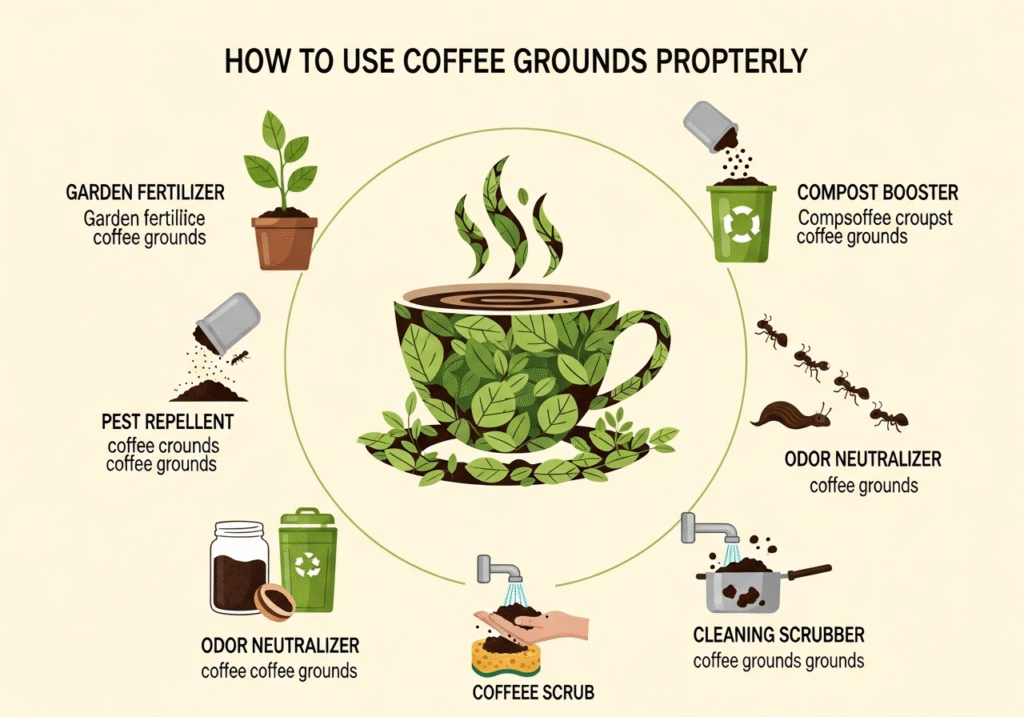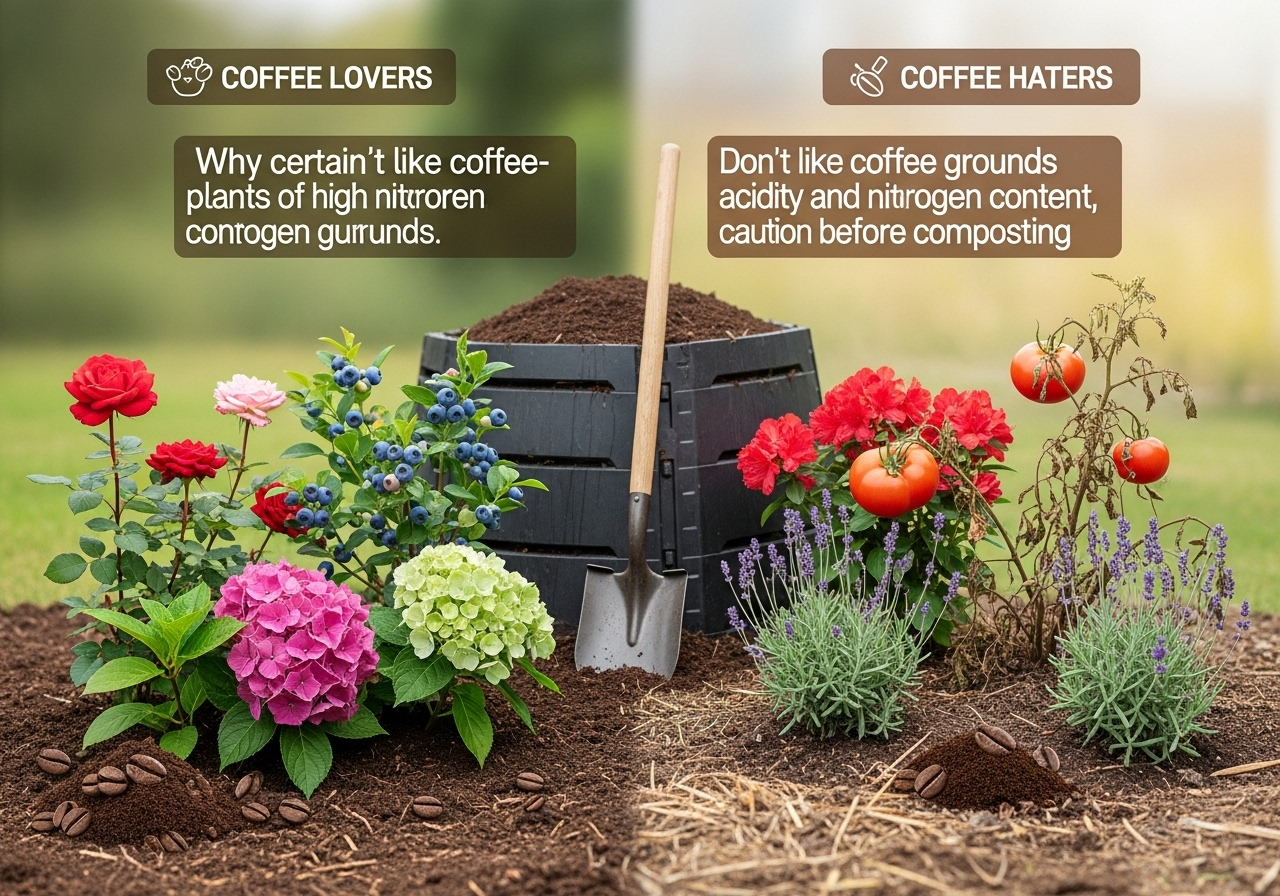Introduction
Coffee lovers often wonder what plants don’t like coffee grounds after hearing about using their morning brew leftovers in the garden.
While coffee grounds can be beneficial for some plants, many gardeners don’t realize that certain plants actually struggle when exposed to coffee grounds.
Learning which houseplants don’t like coffee and what vegetables don’t like coffee grounds can save your garden from potential damage and help your plants thrive.
Why Some Plants Don’t Like Coffee Grounds
Coffee grounds affect plants in several ways that can be harmful to certain species. The main reasons some plants don’t respond well to coffee grounds include:
Acidity Levels
Coffee grounds are acidic, with a pH typically ranging from 6.0 to 6.8. Plants that prefer neutral or alkaline soil conditions can suffer when coffee grounds lower the soil pH further than they can tolerate.
Nitrogen Content
Fresh coffee grounds contain high levels of nitrogen, which can actually inhibit seed germination and root development in sensitive plants. This excess nitrogen can burn delicate roots and stems.
Caffeine Effects
Coffee grounds contain residual caffeine, which acts as a natural herbicide. This caffeine can stunt growth in plants that are sensitive to this compound.
Compaction Issues
When used improperly, coffee grounds can create a compact layer that prevents proper water drainage and air circulation around plant roots.
Plants That Should Avoid Coffee Grounds
Several categories of plants should not be exposed to coffee grounds due to their specific growing requirements:
Alkaline-Loving Plants
Plants that thrive in alkaline conditions struggle with the acidic nature of coffee grounds:
- Lavender – Prefers alkaline soil and can develop root rot with acidic amendments
- Rosemary – Needs well-draining, slightly alkaline conditions
- Sage – Another Mediterranean herb that dislikes acidic soil
- Clematis – This flowering vine prefers neutral to slightly alkaline soil
- Asparagus – Grows best in neutral to slightly alkaline conditions
Plants Sensitive to Caffeine
Some plants are particularly sensitive to the caffeine residue in coffee grounds:
- Geraniums – Can experience stunted growth and leaf discoloration
- Asparagus ferns – May develop brown tips and reduced vigor
- Chinese evergreens – Can show signs of stress and slower growth
Houseplants That Don’t Like Coffee

When considering which houseplants don’t like coffee, several popular indoor plants should be kept away from coffee grounds:
Succulents and Cacti
Most succulents and cacti prefer neutral to slightly alkaline soil and excellent drainage. Coffee grounds can:
- Retain too much moisture
- Lower pH levels beyond their comfort range
- Create conditions for root rot
Popular succulents to keep away from coffee grounds include:
- Jade plants
- Aloe vera
- Echeveria
- Christmas cactus
- Snake plants
Orchids
Orchids have very specific growing requirements and coffee grounds can disrupt their delicate balance.
The acidity and potential for moisture retention make coffee grounds unsuitable for these elegant plants.
Peace Lilies
While peace lilies can tolerate some acidity, coffee grounds often create drainage issues that these plants cannot handle, leading to root problems.
Vegetables That Don’t Like Coffee Grounds
Understanding what vegetables don’t like coffee grounds is crucial for successful vegetable gardening:
Root Vegetables
Many root vegetables prefer neutral soil and can be negatively affected by coffee grounds:
- Beets – Need neutral to slightly alkaline soil for proper root development
- Turnips – Can develop poor root formation in acidic conditions
- Parsnips – Prefer neutral soil conditions for optimal growth
Brassicas
While some brassicas can tolerate slight acidity, many struggle with coffee grounds:
- Broccoli – Can develop poor head formation
- Cauliflower – May produce smaller, less dense heads
- Brussels sprouts – Can experience reduced yield
- Cabbage – May develop loose, poorly formed heads
Legumes
Most legumes prefer neutral soil and have their own nitrogen-fixing abilities:
- Peas – Can be overwhelmed by additional nitrogen
- Green beans – May produce more leaves than pods
- Lima beans – Can experience reduced pod production
Container Plants and Coffee Ground Concerns
The question “what plants don’t like coffee grounds in pots” is particularly important because container growing presents unique challenges:
Drainage Issues
In containers, coffee grounds can create drainage problems more easily than in garden beds. This affects:
- Water movement through the soil
- Oxygen availability to roots
- Risk of fungal diseases
Concentrated Effects
In the confined space of a pot, the effects of coffee grounds are more concentrated, making even tolerant plants potentially struggle.
pH Imbalance
Container plants have less soil to buffer pH changes, making them more susceptible to the acidic effects of coffee grounds.
Which Plants Actually Like Coffee Grounds

While many plants should avoid coffee grounds, some plants genuinely benefit from them:
Acid-Loving Plants
These plants thrive with the acidity that coffee grounds provide:
- Blueberries – Love acidic conditions and benefit from the slow-release nutrients
- Azaleas – Thrive in acidic soil and appreciate the organic matter
- Rhododendrons – Need acidic conditions to absorb nutrients properly
- Camellias – Benefit from both the acidity and organic content
Specific Vegetables That Enjoy Coffee Grounds
Some vegetables actually benefit from coffee ground amendments:
- Carrots – Can benefit from the organic matter when properly composted
- Radishes – May grow better with the slight acidity
- Potatoes – Can benefit from the potassium content
Do Roses Like Coffee Grounds?
Roses have a complex relationship with coffee grounds. While they can tolerate some acidity, fresh coffee grounds should be composted first. Roses prefer:
- Well-composted coffee grounds mixed with other organic matter
- Proper drainage, which coffee grounds alone cannot provide
- Balanced nutrition, not just nitrogen
Do Tomato Plants Like Coffee Grounds?
Tomato plants can benefit from coffee grounds when used correctly:
- Compost coffee grounds first to reduce acidity
- Mix with other organic materials
- Use sparingly to avoid nitrogen burn
- Monitor plant response and adjust accordingly
What Coffee Grounds Repel
Understanding what will coffee grounds repel can help you use them strategically:
Garden Pests
Coffee grounds can deter several common garden pests:
- Slugs and snails – The texture and caffeine content repel these pests
- Ants – The acidity and caffeine disrupt their scent trails
- Cats – Many cats dislike the smell and texture
Do Weeds Like Coffee Grounds?
Most weeds don’t like coffee grounds, especially when applied thickly. The caffeine content and acidity can suppress weed germination and growth, making coffee grounds useful as a natural herbicide in pathways and around established plants that can tolerate them.
How to Use Coffee Grounds Properly

If you want to use coffee grounds in your garden safely:
Composting First
Always compost coffee grounds before using them:
- Mix with brown materials like leaves or paper
- Allow 3-6 months for proper decomposition
- This reduces acidity and eliminates potential problems
Proper Application
When using coffee grounds:
- Never apply more than 25% coffee grounds to any soil mix
- Mix thoroughly with existing soil
- Monitor plant response and adjust accordingly
Testing Soil pH
Before adding coffee grounds:
- Test your soil’s current pH level
- Know your plants’ pH preferences
- Monitor changes after application
Common Mistakes to Avoid
Using Fresh Coffee Grounds
Fresh coffee grounds are more acidic and contain more caffeine than composted ones. Always compost first unless you’re specifically trying to repel pests.
Over-Application
Too much of any amendment can harm plants. Start with small amounts and observe plant response.
Ignoring Plant Preferences
Not all plants respond the same way. Research each plant’s specific needs before applying coffee grounds.
Poor Mixing
Coffee grounds should never be applied as a thick layer. Always mix with soil or other organic materials.
Conclusion
Compromising what plants don’t like coffee grounds is essential for successful gardening
While coffee grounds can benefit acid-loving plants like blueberries and azaleas, many plants including most houseplants, alkaline-loving vegetables, and container plants should avoid direct contact with coffee grounds.
The key to using coffee grounds successfully lies in proper composting, understanding your plants’ specific needs, and applying them correctly when appropriate.
Remember that what vegetables don’t like coffee grounds often includes root vegetables and brassicas, while plants that do benefit from them require careful application and monitoring.
Whether you’re wondering which houseplants don’t like coffee or what plants don’t like coffee grounds in pots, the safest approach is to compost your coffee grounds first and research each plant’s specific requirements.
This way, you can enjoy the benefits of recycling your coffee waste while keeping your plants healthy and thriving.
Ready to improve your gardening success?
Start by identifying which of your plants fall into the categories that should avoid coffee grounds, and consider composting your coffee waste properly before any garden application.

